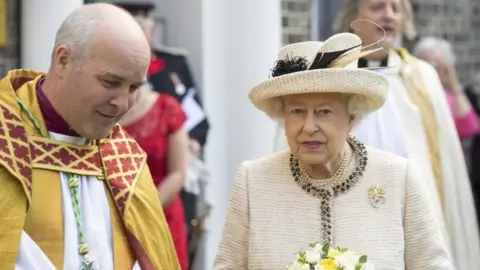New Archbishop of York: Evangelist Stephen Cottrell
 PA Media
PA MediaA pastoral theologian who combines a lifelong affection for traditional liturgy with a desire to commend the Christian faith to the unchurched, Stephen Cottrell has been appointed the 98th Archbishop of York, the second most senior cleric in the Church of England.
Currently the Bishop of Chelmsford, he succeeds John Sentamu, the highest ranking BAME cleric, who retires as Archbishop of York next summer.
Educated at a non-selective secondary school in Essex, Stephen Cottrell went on to to secure a BA at the Polytechnic of Central London before undergoing ordination training at St Stephen's House in Oxford.
He was ordained priest in 1985 before beginning his ministry at Christchurch, Forest Hill in south east London, and then moved onto the dioceses of Chichester and Wakefield.
His emphasis upon evangelism and outreach to the unchurched brought him to the attention of senior clergy and he was nominated area Bishop of Reading in 2004 after Jeffrey John controversially withdrew his nomination to the post.
John was pressured to stand aside by then Archbishop of Canterbury Rowan Williams, who feared that elevating an openly gay priest to the position of bishop was likely to split the Anglican Communion. Stephen Cottrell had supported Jeffrey John's original appointment.
After serving as Bishop of Reading for six years, he became Bishop of Chelmsford in 2010 and will take up his new post in June 2020.
'Nurture your inner slob'
He has written widely on evangelism, discipleship and spirituality, including a series of meditations on Holy Week entitled The Things He Carried (2008) and a book of reflections on the paintings of Stanley Spencer, called Christ In The Wilderness (2012).
His approach to prayer and contemplation was emphasized in his book Do Nothing To Change Your Life (2007) in which he challenged the notion that meaning and value can only be found in activity and productivity.
Instead, he offered a blunt alternative.
"Switch off the TV," he wrote, "put this book down; shut your eyes; breathe deeply; do nothing but listen to the things you can't hear. Nurture your inner slob. You might even find you begin to pray - by enjoying the intimacy of God's presence and the fragile beauty of each passing moment."
One area in which he has been outspoken is the issue of nuclear weapons. During the General Synod last year, Bishop Stephen said there were "no circumstances" in which the use of modern-day Trident missiles could be justified given the destruction they would cause.
"The argument," he said, "that they have worked as a deterrent is no argument at all. Our holding them only makes them seem more attractive to other nation states."

In April this year, he was signatory to a letter signed by 25 priests and bishops who opposed a service at Westminster Abbey, designed to mark 50 years of constant patrols by the UK's nuclear deterrent.
Bishop Stephen said: "While I do not doubt Westminster Abbey's good intentions to make this a celebration of those men and women who serve in the Royal Navy… it is impossible not to view this service as appearing also to celebrate the weapons themselves."
Despite protests, the service went ahead as planned.
Bishop Stephen says he's humbled and honoured to have been appointed Archbishop of York. But friends say that, when he takes up his post at York Minster, he is likely to regret the increased distance from his other favourite place of worship. He is a lifelong supporter of north London's Tottenham Hotspur Football Club.
